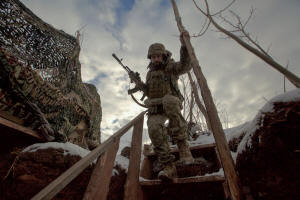NATO beefs up eastern flank, Russia denounces Western 'hysteria'
 Send a link to a friend
Send a link to a friend
 [January 24, 2022]
By Dmitry Antonov and Sabine Siebold [January 24, 2022]
By Dmitry Antonov and Sabine Siebold
MOSCOW/BRUSSELS (Reuters) - NATO said on
Monday it was putting forces on standby and reinforcing eastern Europe
with more ships and fighter jets, in what Russia denounced as an
escalation of tensions over Ukraine.
The move added to a flurry of signals that the West is bracing for an
aggressive Russian move against Ukraine. The Kremlin, in response,
accused the West of "hysteria".
"NATO will continue to take all necessary measures to protect and defend
all allies, including by reinforcing the eastern part of the alliance,"
NATO Secretary-General Jens Stoltenberg said in a statement.
Britain said it was withdrawing some staff and dependants from its
embassy in Ukraine in response to "a growing threat from Russia", a day
after the United States said it was ordering diplomats' family members
to leave.
"Military action by Russia could come at any time," the U.S. Embassy
said https://www.reuters.com/world/us/us-orders-departure-ukraine-embassy-staff-family-members-2022-01-23
in a statement. Officials "will not be in a position to evacuate
American citizens in such a contingency, so U.S. citizens currently
present in Ukraine should plan accordingly," it added.
U.S. diplomats at the embassy in Kyiv were being allowed to leave
voluntarily.
Shares across the world fell as the risk of conflict quashed demand for
riskier assets, and tension over Ukraine was among factors that pushed
up oil prices.

Russia denies planning to invade Ukraine but has used its build-up of an
estimated 100,000 troops near the border to force the West to negotiate
over a range of demands to redraw the security map of Europe.
It wants NATO to scrap a promise to let Ukraine join one day and to pull
back troops and weapons from former Communist countries in eastern
Europe that joined it after the Cold War.
Washington says those demands are non-starters but it is ready to
discuss other ideas on arms control, missile deployments and
confidence-building measures.
The United States and the European Union, wary of Russia's intentions
since it seized Crimea and backed separatists fighting government forces
in eastern Ukraine in 2014, have warned Russia not to invade.
Denmark said the EU was ready to impose "never-seen-before" economic
sanctions and EU foreign ministers meeting in Brussels said they would
send a unified warning to Moscow.
The rouble hit a 14-month low against the dollar, while Russian stocks
tumbled. The dollar-denominated RTS share index was down 8.9%, and the
rouble-based MOEX down 6.8%.
RUSSIA DENOUNCES 'HYSTERIA' AND 'LIES'
Russia is awaiting a written response to its demands this week after
talks last Friday - the fourth round this month - produced no
breakthrough.
[to top of second column]
|

A service member of the Ukrainian armed forces walks at combat
positions near the line of separation from Russian-backed rebels
near Horlivka in the Donetsk region, Ukraine, January 22, 2022.
Picture taken January 22, 2022. Picture taken REUTERS/Anna
Kudriavtseva/File Photo
 Having engineered the crisis by
surrounding Ukraine with Russian forces from the north, east and
south, Moscow is now citing the Western response as evidence that it
is under threat from NATO and Ukraine.
"As for specific actions, we see statements by the
North Atlantic Alliance about reinforcement, pulling forces and
resources to the eastern flank. All this leads to the fact that
tensions are growing," Kremlin spokesman Dmitry Peskov said.
"This is not happening because of what we, Russia, are doing. This
is all happening because of what NATO and the U.S. are doing and due
to the information they are spreading."
He said the West was showing "hysteria" and putting out information
"laced with lies".
The NATO statement said Denmark, Spain, France and the Netherlands
were all planning or considering sending troops, planes or ships to
eastern Europe. Ukraine shares borders with four NATO countries:
Poland, Slovakia, Hungary and Romania.
BIDEN CONSIDERS U.S. OPTIONS
President Joe Biden has begun considering options for boosting U.S.
military assets in the region, senior administration officials said,
after he met top national security aides at his Camp David retreat
on Saturday.
The New York Times said Biden was mulling plans to send 1,000 to
5,000 troops to eastern European countries, with the possibility of
increasing the number should tensions flare further.
A senior administration official declined to confirm the numbers on
Sunday but said "we are developing plans and we are consulting with
allies to determine options moving forward."
Ukraine's Foreign Ministry said in a statement that it considered
the move to send home U.S. diplomats' families as "premature and a
manifestation of excessive caution."
"In fact, there have been no cardinal changes in the security
situation recently: the threat of new waves of Russian aggression
has remained constant since 2014 and the buildup of Russian troops
near the state border began in April last year," it said.
Britain said at the weekend it had information the Russian
government was considering a former Ukrainian lawmaker as a
potential candidate to head a pro-Russian puppet leadership in Kyiv.

The Russian Foreign Ministry dismissed the British allegation as
"disinformation," accusing NATO of escalating tensions over Ukraine.
(Additional reporting by Andrew Osborn and Moscow buro, Pavel
Polityuk in Brussels, Marine Strauss and Robin Emmott in Brussels,
Writing by Mark Trevelyan, Editing by Timothy Heritage)
[© 2022 Thomson Reuters. All rights
reserved.] This material may not be published,
broadcast, rewritten or redistributed.
Thompson Reuters is solely responsible for this content. |